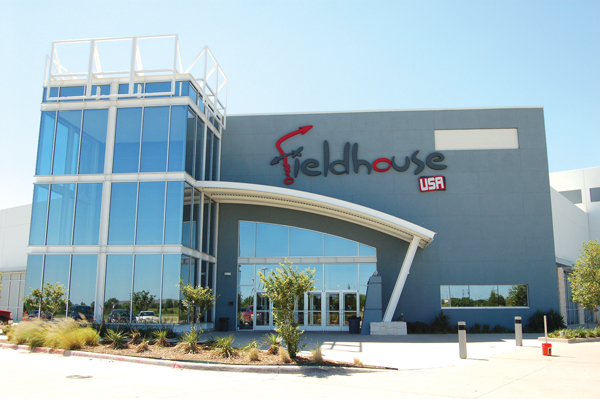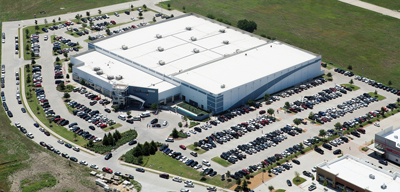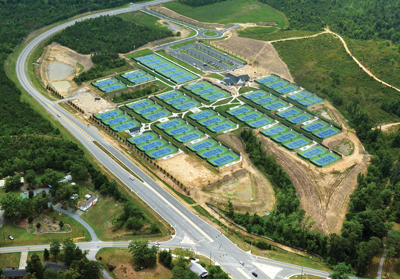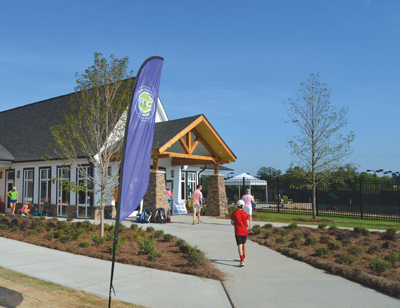 |
FieldhouseUSA currently has an indoor complex in Frisco, Texas, with more under construction.
Photo by: FIELDHOUSEUSA
|
Multi-venues
Ripken Baseball
Ripken Baseball now operates three complexes developed through either private funding or a mix of public and private financing, with the newest coming on line this year in Pigeon Forge, Tenn.
Ripken Experience Aberdeen Powered by Under Armour (2003)
Aberdeen, Md.
■
Cost: $21 million.
■ Major corporate partner: Under Armour
■ The venue: 70 acres; six fields modeled after Fenway Park, Wrigley Field, Memorial Stadium, Nationals Park, Citizens Bank Park and Yankee Stadium. The seventh and primary field, Cal Sr.’s Yard, is a two-thirds-sized replica of Oriole Park at Camden Yards with seating for more than 6,000 fans and hotel accommodations designed to replicate the iconic Baltimore warehouse.
Ripken Experience Myrtle Beach (2006)
Myrtle Beach, S.C.
■ Cost: $26 million.
■ Major corporate partner: Gatorade
■ The venue: 50 acres; five youth diamonds are replicas of Duncan Field, Navin Field, Huntington Park, Shibe Park and West Side Grounds; four regulation-sized fields are replicas of Crosley Field, Griffith Stadium, Ebbets Field and the Polo Grounds.
Ripken Experience Pigeon Forge (2016)
Pigeon Forge, Tenn.
■ Cost: $22.5 million.
■ Major corporate partners: Dollywood theme park; LeConte Medical Center.
■ The venue: 50 acres; six youth ballfields borrow their design from current and former ballparks highlighting a player’s progression from the minors to MLB: Camden Yards (Baltimore), Isotopes Park (Albuquerque, N.M.), Fluor Field (Greenville, S.C.), BB&T Ballpark (Winston-Salem, N.C.), Calfee Park (Pulaski, Va.) and Engel Stadium (Chattanooga, Tenn.).
 |
FieldhouseUSA is projected to have four facilities by January 2017.
Photo by: FIELDHOUSEUSA |
FieldhouseUSA
FieldhouseUSA Partners is an entertainment development and facility operating company that will soon be running four publicly owned indoor venues. FieldhouseUSA typically pays for all the maintenance and operational expenses and makes an annual lease payment, as well as various revenue sharing back to the venue owner.
Frisco, Texas (2009)
■ Cost: $12.5 million.
■ Funding: City of Frisco.
■ Major corporate partners: Coca-Cola; Frisco Orthopedics & Sports Medicine; David McDavid Honda of Frisco.
■ The venue: 145,000-square-foot indoor facility for team sports such as basketball, soccer, volleyball and flag football. The Hampton Inn Suites Frisco North-FieldhouseUSA opened last year.
Big League Dreams maintains and operates 11 parks in four states. Each venue was paid for and is owned by the regional municipality. BLD operates each complex, covers operating costs and shares revenue. BLD serves as design and construction consultant for each project.
| City (year opened) |
Acres/no. of fields |
Construction cost |
| Cathedral City, Calif. (1998) |
24 acres/5 fields |
$6.4 million |
| Jurupa Valley, Calif. (2000) |
30 acres/7 fields |
$8.5 million |
| Chino Hills, Calif. (2003) |
35 acres/6 fields |
$13.1 million |
| Redding, Calif. (2004) |
30 acres/5 fields |
$12.4 million |
| League City, Texas (2005) |
34 acres/6 fields |
$22.7 million |
| Manteca, Calif. (2006) |
30 acres/6 fields |
$22.0 million |
| Gilbert, Ariz. (2008) |
40 acres/8 fields |
$34.5 million |
| West Covina, Calif. (2008) |
30 acres/6 fields |
$21.9 million |
| Mansfield, Texas (2008) |
45 acres/8 fields |
$24.5 million |
| Las Vegas (2010) |
35 acres/6 fields |
$28.5 million |
| Perris, Calif. (2012) |
35 acres/6 fields |
$24.9 million |
Mansfield, Texas (December 2016)
■ Cost: $13.62 million.
■ Funding: City of Mansfield.
■ The venue: 110,000 square feet; eight basketball courts that can be converted into 12 volleyball courts.
Council Bluffs, Iowa (January 2017)
■ Cost: $13.7 million.
■ Funding: The project received a $4.5 million grant that will be repaid via a hotel tax. MAC Ventures, a business entity put together by the independent nonprofit Iowa West Foundation, is the purchaser and master developer of the field house and hotel complex.
■ The venue: Approximately 144,620 square feet; 12 volleyball and eight basketball courts. A 130-room Courtyard by Marriott is being built connected to the Mid-America Center.
Grapevine, Texas (January 2017)
■ Cost: Not available.
■ Funding: Not available.
■ The venue: The city of Grapevine and Simon Property Group, owner of Grapevine Mills mall, announced in June that the 106,000-square-foot space will open inside the mall, containing nine basketball courts and nine volleyball courts.
Other venues
Elgin Sports Complex (1986)
Elgin, Ill.
■ Cost: Not available.
■ Funding: The city of Elgin bought a 408-acre site from the state for $610,000 in 1980; construction was funded partially by a $200,000 state grant.
■ The venue: 10 lighted softball fields, 10 full-size soccer fields, two sand volleyball courts, and one BMX track.
National Sports Center (1990)
Blaine, Minn.
■ Cost: $55 million.
■ Funding: State-owned, self-supported by revenue. State funds were used to build the facility, but no operating subsidy is provided. The original state investment was $20 million. The city of Blaine is seeking $8.7 million in state funding to add 12 more playing fields, build a new maintenance building and rebuild a road leading to the complex.
■ Major corporate partners: Schwan’s, Pepsi, Connexus Energy, Twin Cities Gateway, St. Paul Pioneer Press.
■ The venue: 600 acres; 52 soccer fields; 8,500-seat stadium; eight-sheet, 300,000-square-foot Schwan Super (ice) Rink; 250-meter, wooden cycling velodrome.
Cooperstown Dreams Park (1996)
Cooperstown, N.Y.
■ Cost: $1 million
■ Funding: Privately funded, mostly from corporate sponsors, including Hershey, Pepsi, Kodak and Rawlings.
■ The venue: 165 acres; 22 ballparks.
ESPN Disney Wide World of Sports Complex (1997)
Orlando
■ Cost: $100 million
■ Funding: Private
■ Major corporate partners: Apex by Sunglass Hut, Champion, CMN Hospitals, Chiquita, Dannon, Genie, Hess, HP, Jif, New Balance, Toro.
■ The venue: Nine multipurpose fields; six softball/youth baseball fields; four professional-size baseball fields, including a 9,500-seat stadium; nine-lane track and field complex; 10 clay tennis courts including a 1,000-seat stadium; 5,000-seat arena; 44,800-square-foot indoor basketball and volleyball facility.
Snowden Grove Park (1999)
Southaven, Miss.
■ Cost: $7 million.
■ Funding: 100 percent public; a $1 million, 10-year agreement, signed last year with Mississippi-based BankPlus for the naming rights to the site’s amphitheater, will help pay for a planned $2.1 million renovation expected in 2017.
■ The venue: 200 acres; 17 baseball fields.
United Sports (1999)
Downingtown, Pa.
■ Cost: $15 million.
■ Funding: 100 percent publicly owned; privately operated.
■ The venue: 60 acres; 11 fields; 127,000-square-foot multisport field house. The complex was renovated in 2008.
Cary Tennis Park (2000)
Cary, N.C.
■ Cost: Original cost is not available, but a current $5.12 million expansion is scheduled to be complete in early 2017.
■ Funding: Public.
■ The venue: 29 lighted courts.
WakeMed Soccer Park (2002)
Cary, N.C.
■ Cost: $14.5 million; $6.3 million expansion in 2012
■ Funding: Wake County hotel room and prepared food and beverage taxes; town of Cary operates and maintains the complex.
■ The venue: 150 acres; three lighted, FIFA-regulation-sized fields, one has a 10,000-seat stadium and the other two have 1,000 permanent bleacher seats. Four other competition fields and a cross-country course.
Aurora Sports Park (2002)
Aurora, Colo.
■ Cost: $15 million; $11 million renovation in 2015.
■ Funding: 100 percent public.
■ The venue: 250 acres; 12 baseball and softball fields; 23 multiuse fields.
The Ballfields at Craig Ranch (2004), McKinney Soccer Complex at Craig Ranch (2005)
and The Beach at Craig Ranch (2010)
McKinney, Texas
■ Cost: Not available
■ Funding: A privately funded 2,200-acre master-planned business, retail, entertainment and residential community in the North Dallas area.
■ The venues: The Ballfields consist of 75 acres, eight youth baseball fields, five additional softball/baseball fields and two professional-sized baseball fields with press boxes, full locker rooms and seating for up to 2,500 people. Soccer fields: 65 acres; 12 lighted fields with bleachers; an additional 1,000-seat lighted championship field. The Beach: 12 sand courts for professional and junior play volleyball. Dr Pepper StarCenter McKinney, a training facility for the Dallas Stars, is also on the site.
Rocky Mount Sports Complex (2006)
Rocky Mount, N.C.
■ Cost: $10 million
■ Funding: Property and hotel room taxes; publicly owned and operated.
■ The venue: 143 acres; six youth baseball fields; four interchangeable baseball/softball fields; one championship baseball field; eight soccer/football fields; one professional disc golf course.
Citizens Bank Fields at Progin Park (2007)
Lancaster, Mass.
■ Cost: $9.5 million.
■ Funding: 100 percent private; owned and operated by the nonprofit Massachusetts Youth Soccer Association. MYSA received $600,000 from Citizens Bank for the construction in exchange for naming rights.
■ Major corporate partners: Citizens Bank, Sports Authority, Nike Soccer, Boston Children’s Hospital, Coca-Cola, Soccer.com, Northeast Promotion & Apparel, Dinn Bros., Bownet.
■ The venue: 136 acres; 11 natural grass fields; five synthetic turf fields.
Scheels Overland Park Soccer Complex (2009)
Overland Park, Kan.
■ Cost: $36 million
■ Funding: City funded and owned. Scheels All Sports last year signed a five-year, $625,000 deal for naming rights.
■ The venue: 96 acres; 12 synthetic turf soccer fields.
Premier Sports Campus at Lakewood Ranch (2011)
Lakewood, Fla.
■ Cost: Not available.
■ Funding: Privately owned and operated.
■ The venue: 140 acres; 22 multiuse grass fields, eight of which are lighted. The complex added a 3,000-seat stadium in May 2016.
Nations Park (2012)
Newberry, Fla.
■ Cost: $7.7 million.
■ Funding: Partnership between the city of Newberry, Nations Baseball Florida Inc., and the Alachua County Tourism Development Board. A local family donated about 80 acres for the baseball and softball complex, and the city won a $700,000 state grant for the park. In 2010, the Alachua County Commission voted to commit a one-cent hotel tax, expected to raise between $12 million and $13 million over 20 years to repay construction bonds for the park.
■ Major corporate partners: Capital City Bank, Coca-Cola, Hardee’s, Louisville Slugger, Orkin, Powerade.
■ The venue: 40 acres; 16 baseball fields.
Woodside Sports Complex (2013)
Mauston, Wis.
■ Cost: $40 million.
■ Funding: Approximately 80 percent from private funds.
■ The venue: 245 acres; eight synthetic turf baseball/softball fields. Future plans include on-site housing, the addition of 10 synthetic turf soccer/multipurpose fields and 20 sand volleyball courts. The 90-room Olde Town Hotel is scheduled to open next month on-site.
Spooky Nook Sports Complex (2013)
Manheim, Pa.
■ Cost: $25 million.
■ Funding: Sam Beiler purchased an empty facility in 2011 for $11.25 million and privately funded the development of the complex.
■ The venue: 700,000 square feet under one roof and 50 acres of outdoor facilities; 10 hardwood basketball courts; 10 volleyball courts; six tennis courts; four field hockey fields; six soccer fields. The Warehouse Hotel, with 135 rooms, is on-site.
 |
The just-completed Rome Tennis Center at Berry College features 60 tennis courts, with plans to add six more outdoor and six more indoor courts.
Photo by: ROME TENNIS CENTER AT BERRY COLLEGE (2)
|
Rome Tennis Center
at Berry College (July 2016)
Rome, Ga.
■ Cost: $12 million.
■ Funding: City of Rome-Floyd County special purpose sales tax; land donated by Berry College.
■ The venue: 30 acres; 60-court tennis center features U.S. Tennis Association-standard, asphalt tennis courts and includes six NCAA regulation courts, three center courts for tournament and collegiate play, and one exhibition court. The plan allows for the addition of six outdoor and six indoor courts.
Gateway Soccer Complex (Spring 2017)
Grandview, Mo.
■ Cost: $234 million.
■ Funding: The developers are paying for about 80 percent and the city is offering $43 million in tax incentives.
■ The venue: Mixed-use sports complex that combines 14 synthetic turf youth soccer fields, 397,000 square feet of retail and office space, and two hotels. The developers announced a partnership last month with Liberty Hotel Group to build two hotels (450 rooms) on-site, including a Best Western Plus.
Source: SportsBusiness Journal research







